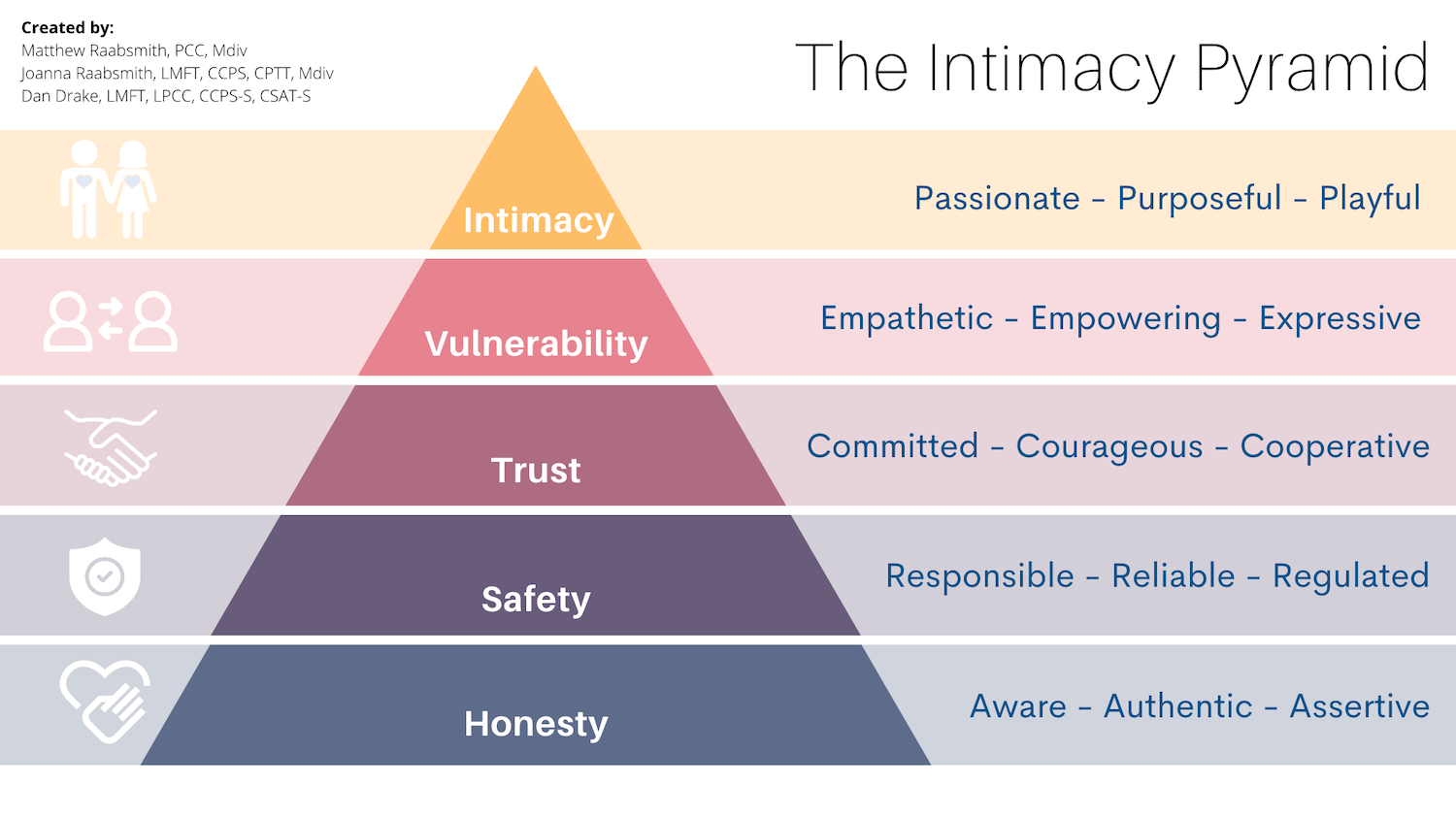Couples looking to recover from the damaging impacts of pornography, infidelity, lying, and betrayal begin the long road to intimacy by reestablishing a secure foundation. To do this they have to address what the betrayal has destroyed. While relational intimacy is the goal, there is a lot that needs to be made right to get to that place.
There is an important order to the steps that we see work best for couples healing. We introduced those steps and the journey through the Intimacy Pyramid in our last post. Here again is what it looks like…
 To begin the restoration process we start where the damage began: with the lie.
To begin the restoration process we start where the damage began: with the lie.
Betrayal in all its forms is a lie. Whether it is a full blown physical affair, compulsive use of pornography, or escaping into a sexualized fantasy world, it is all a lie. First it is a lie because I have broken my marriage vows. Sexual betrayal is not the love and fidelity I promised. My lack of integrity every time I act out renders our relationship one built on my dishonesty. Betrayal is also a lie because it is always hidden, minimized, covered up, justified and forgotten. Betrayal is not planned by a couple, it is done in the secret actions of a partner. If a relationship is going to rebuild towards intimacy it will begin by restoring the foundation of honesty.
First, by honoring my vows of fidelity.
If I am still acting out, using porn, lusting, or connecting with an affair partner then “we” are not moving towards intimacy. We are moving towards divorce because of my choices. Each partner gets a choice every day whether or not to stay in the marriage. When I engage in destructive sexual behaviors, I am making the choice to leave the marriage. It’s impossible to work on healing the relationship with only one person present. Continuous sobriety and a strong recovery plan are essential in building a foundation of honesty.
Second, we rebuild honesty through the ending of lies and the free flow of information between partners.
If I continue to hide or protect information, make false statements, or omit details then there is nothing for us to build our future on. Just like acting out, informational betrayal steps outside of the relationship by being the only partner with all the information. It erodes trust quickly and is difficult and time consuming to rebuild the damage of this type of broken trust.
While a partner may choose to patiently wait on their spouse to find freedom from destructive sexual behaviors and also learn to be open and honest, that one faithful spouse can’t do the work required by two. But once both partners are honoring their vows of faithfulness and not leaving the marriage (through acting out or deception) this is what the restoration of honesty can be.
In our book we describe it this way: honesty is the regular practice of transparency with self and others.
Now there are a lot of practical ways that we help people build honesty in marriage, but the strengthening of honesty starts with my ability to know and reflect on myself – we call this awareness. The skill of awareness is one of the key definers in a couple’s ability to restore their relationship after betrayal. We like to say, “If I am not aware…then I don’t have much to share.”
Growing awareness takes practice.
I can practice building it by tracking and reflecting. Tracking means keeping an eye on what happens to me and how it affects me. People who are aware can tell you a lot about their day. This sounds elementary, but is pretty amazing how many of us struggle to remember much about our experiences. If I want to be honest then I have to connect with what I am going through. And I also have to reflect on my experiences. Reflecting is taking the information of the day and trying to figure out what it tells me. This usually looks like identifying my feelings. It may also mean diving deeper around the why questions of my day.
Building honesty also mean pushing into the type of awareness around my past.
I have to know how my past has shaped and impacted me, and how those impact are showing up in my present. If I am not aware of these things, I will have diminished power in changing them. Often in our work with couples, one spouse may ask their betraying partner why they made certain decisions or how they felt, the answer of “I don’t know” or “I don’t remember” does not get them off the hook for answering those questions with full openness and transparency. A more honest answer would be, “I do not have enough self awareness to be able to answer that fully, but it is my responsibility in our relationship to do the work to grow my awareness so I can be more fully honest with you.”
For couples where there has been this relational breach of trust, we turn that work of honesty into a guided Full Disclosure. This is a disclosing of all the relational information that has been hidden from one partner. Practically this looks like spending multiple weeks with a trained professional creating a clear account of all problematic sexual behaviors, past and present. This radical shift into transparency helps both partners. For the betraying spouse it puts an end to the hiding and finally addresses the nagging question that usually stands behind every lie: “if they knew this about me, would they still want to stay?” Completing and sharing a Full Disclosure is a daunting task, but in our work we have seen clients find so much freedom in this process.
For the betrayed spouse, discovering infidelity is a serious trauma.
Their whole world and what they thought they knew is re-oriented in an instant. As difficult as it is for betrayed clients to sit through a professionally guided Full Disclosure, getting a clear, complete picture provides this partner the information they need to fully address the trauma they have experienced. With the Full Disclosure complete, a betrayed partner finally gets to make a truly informed decision about their safety in the relationship. For the couple, it is the first moment in their relationship they have had the power to build a safe and healthy relationship. For the first time, everything that needs to be dealt with is out in the open, now they both get the choice in how to approach the realities that their relationship is facing.
But this is just the beginning of creating an honest relationship.
We also help couples rebuild honesty through a daily connection time. This is where both parties are expected to reflect and share. This helps the couple utilize time together to change how they go about being open and transparent with information in the relationship moving forward. With a regular connection practice each partner is able to further develop awareness, as well as begin to demonstrate consistent authenticity with each other.
For the betraying spouse, authenticity looks like continuing to own my story, my emotions, and my choices on a day to day level. This maintains transparency with self and others. For the betrayed partner, this means being honest about the effects of what has happened in the relationship and its current affect on you. Learning how to do this appropriately is an asset for a few reasons.
One, it creates clarity for the relationship, allowing the couple to self assess where restoration of trust must begin.
Second, it provides an opportunity for the betraying spouse to demonstrate safety which we will cover in the next section.
And third, it helps the betrayed spouse bring awareness and assertiveness around what he/she needs at this time.
We realize for most couples this level of open sharing may feel scary. Especially for couples with a history of betrayal. That is why we can’t stress enough the need for good support resources. A professionally trained therapist or coach is almost always a must. And it is important that each partner has a robust network of support.
This is why we love resources like Small Groups Online and Live Free.
Our history of working with relationships in this phase of honesty tells us this work is difficult but crucial. There is great opportunity if we can follow the right path, study the right resources, and maintain the right support in place. And ultimately, it is the only way forward if you desire true intimacy with your spouse. The experience of being fully know, accepted and loved is incredibly intimate, but impossible if your story is not fully known by you and your partner. Learning your story, and learning how to share it vulnerably and courageously is vital for the health of your relationship.
For more information on the work we do and our new book Building True Intimacy check out www.intimacypyramid.com.


